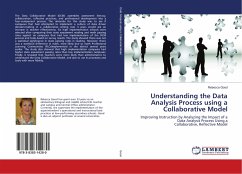
Understanding the Data Analysis Process using a Collaborative Model
Improving Instruction by Analyzing the Impact of a Data Analysis Process Using a Collaborative, Reflective Model
Versandkostenfrei!
Versandfertig in 6-10 Tagen
39,99 €
inkl. MwSt.

PAYBACK Punkte
20 °P sammeln!
The Data Collaborative Model (DCM) assembles assessment literacy, collaboration, reflective practices, and professional development into a four-component process. The rationale for this study was to see if campuses that had attempted to implement a culture of data driven decision-making in a collaborative setting over 3 years would see an increase in teacher effectiveness. Six high implementation schools were selected after comparing their state assessment reading and math passing rates against six campuses that had low implementation of the DCM process and tools based on survey results. The s...
The Data Collaborative Model (DCM) assembles assessment literacy, collaboration, reflective practices, and professional development into a four-component process. The rationale for this study was to see if campuses that had attempted to implement a culture of data driven decision-making in a collaborative setting over 3 years would see an increase in teacher effectiveness. Six high implementation schools were selected after comparing their state assessment reading and math passing rates against six campuses that had low implementation of the DCM process and tools based on survey results. The study showed there was not a statistical significance in state passing rates in reading. However, there was a statistical difference in math, most likely due to math Professional Learning Communities (PLCs)implemented in the district several years earlier. The study also showed that high implementation campuses had higher state assessment passing rates than low implementation campuses. Finally, it revealed that teachers were more likely than administrators to understand the Data Collaborative Model, and also to use its processes and tools with more fidelity.












